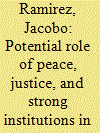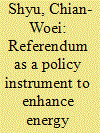|
|
|
Sort Order |
|
|
|
Items / Page
|
|
|
|
|
|
|
| Srl | Item |
| 1 |
ID:
186459


|
|
|
|
|
| Summary/Abstract |
We conducted a qualitative study (2019–22) to contextualise Colombia's energy policy for sustainable development and renewable energy diversification, focusing on the new governance toolbox of market incentives, weak institutions, security risks in areas of limited statehood, and the role of indigenous people. We also examined how geopolitical events, such as COVID-19 and the Russian invasion of Ukraine, are affecting fossil fuel and decarbonisation strategies. Our findings suggest that weak institutions are a major obstacle to Colombia's energy transition. The Western definition of energy democracy takes for granted good governance in line with SDG 16: Peace, Justice, and Strong Institutions; however, in Colombia, the context of social unrest, violence, corruption, and inequality hinders its implementation. Colombia's energy policy considers green investment a market opportunity rather than a way of institution building or phasing down fossil fuels, and there is no meaningful communication with civil society, especially indigenous people, to develop small-scale green investment initiatives. This study enhances energy policy by emphasising the role of governance and strong institutions in energy democracy. We argue that if governments and corporations were committed to climate change mitigation, they would invest in institution building over renewable energy.
|
|
|
|
|
|
|
|
|
|
|
|
|
|
|
|
| 2 |
ID:
192736


|
|
|
|
|
| Summary/Abstract |
This study explores whether energy policy-related referendum initiatives in Taiwan can serve as effective policy instruments for the public to participate democratically in the formulation of energy policy and transition. Taiwan's conventional energy policy-making process is top-down, determined by the government, politicians, and experts. This process was challenged by five bottom-up energy-related referendum initiatives in 2018 and 2021, demanding a reduction in coal-fired electricity generation, electricity generation from nuclear energy instead, and an end to the expansion of large-scale fossil fuel energy infrastructure. The preferences of the general public and government for the energy transition agenda were in conflict. The results show that referendum is an effective and socially integrated policy instrument for enhancing energy democracy and guiding governmental energy transition in Taiwan, particularly by resisting the government's dominant coal-based energy agenda and facilitating a restructuring of the energy sector against various social and contextual pressures on energy preferences and contested policy goals. This bottom-up, exogenous rather than endogenous, and forced rather than voluntary energy policy formulation model corresponds to the international discussion on how energy democracy can change traditional structural power relations between the government and citizens in energy policy formulation and transition.
|
|
|
|
|
|
|
|
|
|
|
|
|
|
|
|
| 3 |
ID:
191287


|
|
|
|
|
| Summary/Abstract |
Energy scholars have associated energy communities with the notions of energy citizenship and energy democracy, as citizen-based democratic governance plays critical roles in their organizational models. However, these roles have recently been challenged by the growing involvement of diverse actors, including businesses and state authorities, in the governance of energy communities. Limited evidence exists of how this evolution has impacted the form and degree of citizen engagement in these organizations. This paper addresses this gap through an analysis of 164 French energy communities. We identify the following four energy citizenship configurations: full citizen ownership, shared citizen ownership, citizen crowdfunding, and civic participation. Then, we analyze their ownership structure and institutional logics. Our results indicate that models characterized by strong citizen engagement in ownership and a strong community logic dominate the French energy community landscape. Furthermore, the community logic is still prominent, even in models where citizens are less central. This suggests that the increasing involvement of other actors in energy communities has not fundamentally threatened such an organizational form as a vehicle for energy citizenship in the French context. Lastly, the paper identifies policies to encourage a variety of energy citizenship models and generalize meaningful citizen engagement.
|
|
|
|
|
|
|
|
|
|
|
|
|
|
|
|
|
|
|
|
|